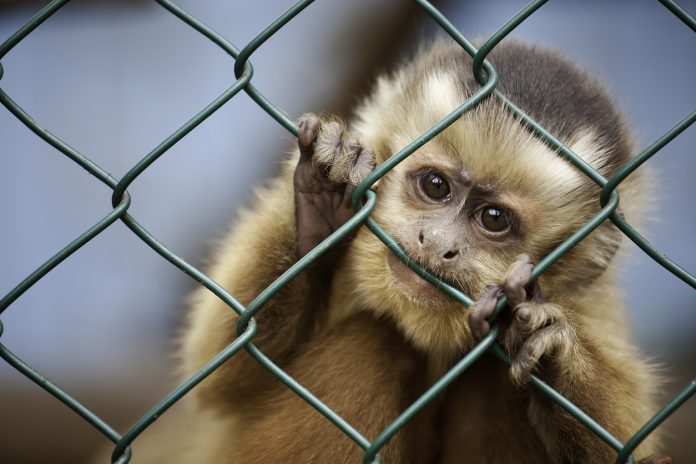Born Free’s Chris Lewis and Dr Mark Jones discuss the legal and ethical implications of keeping primates as pets
In the UK and many other countries, keeping a primate as a pet is entirely legal. Some species, including great apes, lemurs, and some new world monkeys such as capuchins, are considered ‘dangerous’ under British law and require a licence under the Dangerous Wild Animals Act 1976. Many others can be legally kept without a licence. Subsequently, there is little information on how many primates are kept in people’s homes across the UK, although the figure could be well into the thousands. Globally, the trade in live primates as pets is a serious issue.
Following extensive campaigning by animal welfare groups like Born Free, in 2020 the UK Government announced its intention to ban the trade in and keeping of primates as pets in England. However, personnel changes within the government and the failure to progress proposed legislation have seen the process stall. The recently introduced Animal Welfare (Primate Licences) (England) Regulations 2024 creates a licensing system for primate owners which aims to promote higher welfare standards for privately kept primates but does not ban the trade in or keeping of primates, and only applies to England.
Changing demand
Pet primates are big business. The international trade in primates (legal and illegal) has been estimated to be worth $117-138m per year. Prices for individual primates can range from less than $100 to over $10,000. Research has indicated that the number of primates in trade has steadily increased since 1995. The number of primates traded illegally is thought to be higher than those in legal trade.
The increased trade in primates has been fuelled by the growth of social media alongside global access to the internet, which provides sellers and potential buyers with greater opportunities than ever before. The selling of live primates online has been shown to be widespread across range and non-range countries. Studies have found that media stories or social media posts about particularly ‘cute’ or ‘funny’ species result in increases in searches for the species containing the word ‘pet’. Research into the trade in galagos, or bushbabies, found that the number of live exports also increased, and this is likely the same for other primate species. The ability to purchase a primate on a whim can often result in them being bought by individuals who have little or no knowledge of their welfare needs.
The risks of keeping primates as pets
Primates are highly intelligent animals with complex physical, psychological, behavioural, nutritional and social needs which cannot be fully met in a domestic environment. Nevertheless, many primate species can be purchased as easily and legally as any domestic pet. However, primates are wild animals and can become aggressive and dangerous once they reach maturity, increasing the likelihood of neglect and abandonment.
In the UK, the RSPCA has stated that, on average, they receive 50 calls per year in relation to primate welfare, and 60% of the cases they investigate involve primates who are being kept in social isolation. In many countries, the successful establishment of several non-native primate populations outside their natural range has resulted in potentially serious consequences for native wildlife and the wider environment. Additionally, greater contact between humans and wildlife increases the likelihood of zoonotic pathogen transmission in both directions, with both humans and primates particularly at risk from herpesviruses and the monkeypox virus.
Impacts on wild populations
Sixty per cent of primate species are classified as threatened on the International Union for Conservation of Nature (IUCN) Red List, and almost three-quarters are experiencing population declines. The collection of young live individuals from the wild for the pet trade typically involves the killing of their parents and other family members, which can have devastating impacts on their family groups and can seriously disrupt wider populations. South-East Asia’s long-tailed macaques have recently been reclassified as ‘endangered’ by the IUCN, with collection for the pet trade identified among the threats to the species.
International laws and their impact
All primate species are listed in Appendix I or II of the Convention on International Trade in Endangered Species of Wild Fauna and Flora (CITES) and the associated UK and EU implementing legislation. In theory, this should mean that cross-border trade in primates is prohibited (for Appendix I species) or regulated to ensure it is legal and does not threaten wild populations (Appendix II). However, CITES only covers cross-border trade and has no jurisdiction over domestic trade or keeping. In addition, there are exemptions for animals who are bred in captivity. Enforcement of CITES regulations relies on national enforcement agencies that may lack the knowledge, experience or resources to implement the regulations effectively and, in some cases, may be subject to exploitation or corruption.
Despite the apparent hurdles in preventing illegal international trade, a number of countries have implemented, or are in the process of implementing, ‘positive list’ systems for the trade-in and keeping of wild animals as pets, which stipulate criteria that must be met for the keeping of a species to be permitted. Such criteria might include whether the welfare needs of the species can be fully provided for in a private captive setting, whether the trade threatens wild populations, whether there are human health and safety concerns, and whether there is a risk to native wildlife and the wider environment should the animals escape.
The complex needs of primates mean that they frequently fail to meet these criteria and are prohibited under such ‘positive list’ systems. The Scottish Animal Welfare Commission has recommended that the Scottish Government should consider introducing a positive list system. However, as things stand, there are no indications that the UK Government or the devolved administrations are contemplating such a system.
While the introduction of a licensing requirement for keeping primates as pets in England may deter some people, keeping primates as pets remains a serious issue in the UK and beyond. Only a ban can truly protect our nearest relatives from the suffering they experience when traded and kept as pets.
Born Free
www.bornfree.org.uk
Twitter
LinkedIn
Facebook











